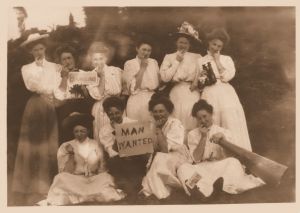
Feminism is not passe
Our guest blogger C. Schembri is back with another topical subject. Is feminism no longer relevant?
Seven years ago someone told me that my article about feminism was outdated and passé, and that there was no need for calls to action in this regard any more. I wondered if this person perhaps thought that it was an old argument abroad and that people have moved on, and only in sad little Malta did it remain, perhaps, valid. Well, we may not be talking about feminism per se nowadays, we have progressed to gender equality, but the argument is still valid and the dialogue certainly needs to be continued.
The gender divide still exists: females are paid less than their male counterparts abroad and locally, rape culture attests to the fact that women are still treated as disposable objects abroad and locally, sexism at the work place, perception of female versus male bosses, amount of women in politics locally, access to free childcare services abroad and locally, porn giving men unrealistic violent expectations, sexual slavery and sex trafficking, verbal and written sexist expressions inbuilt into our very language. The list can go on, varying from minor relatively inconsequential jokes like ‘what was she doing out of the kitchen?’, to rape and sex trafficking.
Let’s talk local specifics: what about those five girls (15 year olds!) who (according to a story recounted by Mons Anton Gouder) made a bet about who would get pregnant first from the same man? Isn’t sexual education another aspect of feminism and gender equality? Are we teaching our girls to practice safe sex, are we telling them about the repercussions (STDs and teen pregnancies)? And what about home education? Do we live in a society which is progressive legally – the introduction of divorce and same sex civil unions which I happily welcomed – but still agonisingly traditional in other respects? And sex education is equally important for boys. We have to move away from the notion that the girl is solely responsible for the baby because she is the one carrying it. It takes the male counterpart to get pregnant, so men should be equally educated and responsible. The mother will give birth, but the father is legally bound to take care of and provide for the child until she or he is 18 years old. To have gender equality both sexes must be equally educated and equally responsible.
We rank 39 out of 148 ranked countries on the Gender Inequality Index, which was developed in 2010 by the United Nations. The GII is calculated on three factors: reproductive health, empowerment and labour market participation. We stand at a total of 0.236, which rests on a scale between 0 (total gender inequality) and 1 (total equality). You may say that 39 is not such a bad ranking for a tiny European island, but when compared to the top ten countries, Netherlands being the first with a GII of 0.045, we are still a long way off. We have a relatively large presence in secondary education and participation in the labour market, but we also have a high adolescent fertility rate ratio. The adolescent fertility ratio is one of the predictors effecting post secondary education. Because let’s face it, how many adolescent mothers will make it to Junior College, Higher Secondary or MCAST if they do not have exceedingly supportive and resourceful family members to help them?
This does not mean that all girls and young women should have a post secondary and tertiary education. Gender equality and female empowerment mean that women should have equal rights, equal rights to making their own choices. And if their choice is to raise a child and have a family rather than focusing on a career that is laudable too; being a mother is arguably the most beautiful thing in human experience. But the choice has to be an informed one, not a circumstantial one.
On a micro level, as women, we also need to be more supportive of each other. There is an often shared meme on Facebook which says ‘Women understand women, and they hate each other’. And it is indeed saddening. We are immersed in a culture which urges us to be competitive, to always be prettier, skinnier or curvier, then other women. At the work place, we have to be cleverer, more popular, and at home we should have tidier homes and better cooked dishes. Why don’t we celebrate each other instead? Why don’t we compliment each other on our efforts, and help each other to survive? Let us realise that we are part of a sisterhood, on a national and international scale, and we should help our sisters in any way we can.
And then we can think about men, there is no rush, they have had it good for centuries. White Christian straight men, that is. Now tell me again feminism is outdated, and passé.
- May 14, 2014 No comments Posted in: Something to say





